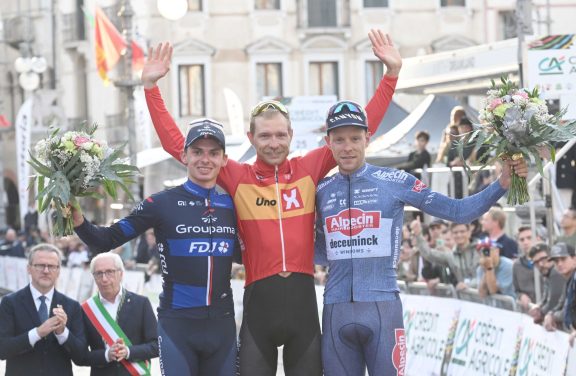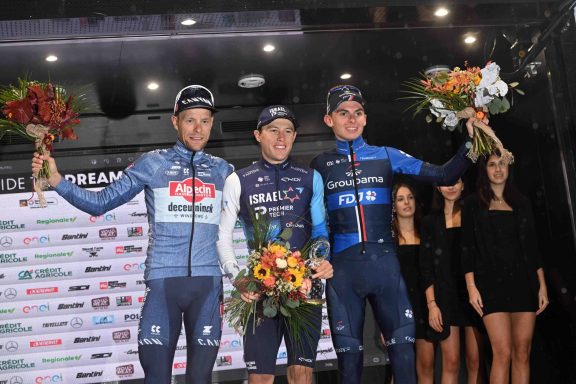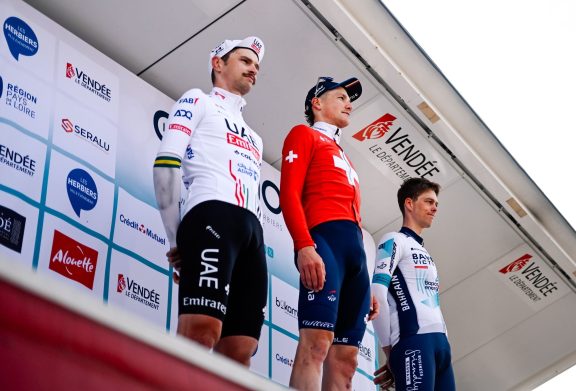A perfect road captain and loyal domestique since joining Groupama-FDJ in 2016, Ignatas Konovalovas experienced his very last season as a professional rider in 2024. Due to a back injury, it unfortunately didn’t go as planned and he couldn’t end his career on the best note. In the middle of the winter, the Lithuanian took a moment to talk about this last year, to look back in the past and to repeat his endless affection to the team.
Ignatas, you are now officially retired. How are you feeling about it?
Honestly, very good! If my career were a glass, I would feel like I had filled it all the way. I am sure I have done 100% of what I could have done. I spent seventeen years as a pro, including nine with Groupama-FDJ. I think that’s really not bad. After everything I’ve experienced, all the people I’ve met along the way, I’m proud and happy to be ending my career. The choice was already made last winter anyway when I signed my 2024 contract.
“The hardest time of my career”
However, your last season didn’t go as you anticipated. Can you take us back to the start of the season, in Australia?
When we had the interviews regarding the 2024 season, the team asked me which races I wanted to do. I’m multitask; I can be with the sprinters as well as the climbers, so they asked me if I had any preferences. I said that I would like to go to Australia because I had never been there in my seventeen-year career. The team agreed, and I spent December with a huge enthusiasm. Even though it was my last year, I was going to do some races that I hadn’t done before, like the Tour of Catalonia. December was great and the preparation went really well. Then, I had a first issue as I left for Australia three days late because I caught Covid after New Year. Once I got there, it was superb! It was warm, we enjoyed the sun, we ate ice cream while it was winter in Europe. However, after our first ride, I noticed that something was wrong with my back. I had two lumbar hernias during my career, so I knew what to do. I did exercises, stretching, it relieved me, so I went for another ride the next day, but after two and a half hours, I realized that I could no longer pedal. From the second day, all my plans fell apart.
How did the situation evolve over there?
We first looked for medical solutions with the race doctor. I visited different osteopaths, chiropractors, and physiotherapists. We did everything we could do over there. Unfortunately, nothing worked out, and I was forced to return to Europe without a single race day in my legs. I couldn’t even leave the hotel because I was in so much pain. I couldn’t stand for very long. I tried to walk to keep myself in movement, hoping that it would help, but I couldn’t stay on my feet for more than 15-20 minutes.
Was this a pain that was familiar to you?
Pretty much yes, except that the pain came from different angles this time. When I returned to Europe, the team organized all the tests very quickly. We immediately proceeded with injections, but you never know with the back if the healing time will be two months, six months, or two years. After talking with Jacky, the team doctor, I planned on being ready after five months maximum. I thought I could make my comeback at the national championships. Unfortunately, it didn’t happen at all like that, and from late January to early February, I first experienced the most difficult period of my career.
“I would leave the house thinking I was going for a three-hour ride, but I would turn around after fifteen minutes”
Why is that?
At that time, I felt pains that I had never felt before. Sometimes I didn’t have enough strength in my legs because of how intense the pain was. Even lying down, I was in pain, and it was so 24 hours a day. It was very, very hard, even though the injection was supposed to relieve me. It was the hardest time of my career, but at that point, I wasn’t even thinking about my career. I was just thinking about being able to walk, being able to hold my children, having a normal life. I couldn’t do anything at all. During the first week, I was also all alone in Spain, where we have our second home. I thought it would be better for me, that I would be less tired, but it was actually worse. When my family joined me, I started to feel calmer, and things improved, but very, very slowly.
What did you do with your days?
I was in bed almost all the time. I would try to walk around the apartment, go out on the terrace, but for the first 2-3 days, I had to ask friends to do the grocery shopping for me at the local supermarket. I went there after 4-5 days but spending 20-30 minutes at the supermarket was already very difficult. So overall, I stayed in bed, with books, podcasts, music, films, but nothing that really helped me feel better. Fortunately, I received a lot of support from the team, and from Jacky in particular. I spoke with him every day and he managed to calm me down. Of course, I was also able to count on my wife who helped me a lot, first through the phone from Lithuania, then in Spain. About a month after my return to Europe, I was able to start playing with the children again. I played lying down because it was hard to sit still, and I would take a break after thirty minutes to rest. When friends came to eat, I could prepare food, I would stay with them at the table for an hour, but I would also ask for a five-minute break to lie down. Then, in March, we returned to Lithuania.
When were you able to start training again?
I was already back on the home trainer in February, but I’m talking about fifteen minutes a day, then twenty, twenty-five, thirty. In the spring, I started riding outside again in Lithuania. I even did more than a hundred kilometers a few times, but at a very easy endurance pace. I never felt able to push a big gear. And then, it was changing. One week, I felt good, then the 3-4 following days I couldn’t get on the bike. I would sometimes leave the house thinking I was going for a three-hour ride, but I would turn around after fifteen minutes because I could feel that it was not doable.
“I only have one regret in my career: to not have been able to finish this last season”
When did you realize that you would not meet the deadline you had set for yourself?
I started to have doubts in early May. I visited several specialists in Lithuania, I traveled all over the country, but it did not improve things much. At the beginning of June, I had a second injection, in Paris, which helped me a lot, and after that we met with the team to talk about a potential surgery. If I had been 24-25 years old and had my whole career ahead of me, we could have made the decision to go for it, to forget the 2024 season and think about the following ones. But since it was my last year, we agreed that it wasn’t reasonable to do all that and push the limits just to do a few races in October. So the verdict came in June. I knew that I wasn’t going to race as a pro anymore.
How did you feel at that moment?
On the one hand, I felt kind of relieved. Part of me knew that it was the best solution at the end of the day. I had given everything, but it was just no longer possible. On the other hand, I was still a little sad. I only have one regret in my career: to not have been able to finish this last season, especially with this team. Groupama-FDJ gave me a lot, we gave each other a lot. It will forever remain in my heart and mind as my cycling family. I would have loved to have been able to go out through the front door.
Did you come to terms with this decision quickly?
Actually yes, because three weeks after the decision was made, I went to Spain with my family to spend the summer. I went to the beach every day with the children, and my wife did a lot more cycling than me (laughs). We kind of swapped roles, but I was really ok with that because I love spending time with the boys. Before, when I would spend the summers in Spain, I would get up at six o’clock to go riding at seven. Last summer, as long as the children didn’t wake me up, I would sleep. Sometimes until ten o’clock, which had never happened to me. And that didn’t stop me from taking a nap in the afternoon (smiles). I can say that these were the first real summer holidays of my adult life. My back was still bothering me a little, but I was able to have a fairly normal life.
“I’m proud to have spent seventeen years at this level and to have always found my place”
You also visited the team on the Vuelta.
We love travelling in a camper van with my family. We’ve been doing it every summer for the last 4-5 years. We had planned a little trip to the North of Spain, towards the Ocean. While preparing the trip, I realised that the Vuelta peloton wouldn’t be far away, so we dedicated one day to go there and visit my friends from the peloton. It was a bit in the middle of nowhere, in the mountains. The people from Groupama-FDJ knew that I was coming, but I’ve also made a lot of friends in the peloton over the past seventeen years, and many were surprised to see me there. It was really a special day. I would be lying if I’d say that I didn’t feel moved when I found myself in the middle of all those people. When I approached the start line, I had a few chills and a few knots in my stomach. But when my wife asked me “would you have liked to do the stage?”, I didn’t think twice before saying no. I was really happy to be there, to see everyone, but I was at peace with my decision. I had moved on.
Do you feel proud about your career?
I am very proud of my career and the way it has developed. At the beginning, growing up, we all dream of being a champion, of winning races. Then, you realize pretty quickly if that’s your path or if that isn’t. I quickly understood that it wasn’t mine. Even before my victory in the Giro, I knew that I would be a domestique, and that didn’t bother me at all. Arnaud or Thibaut would be able to confirm that I enjoy riding for someone else. I am happy with my career, because staying in the peloton for seventeen years when you come from a very small country is not easy. It means that I was not there for nothing, and especially not because my father or my uncle knew someone… It means that I was valued for my abilities, for what I could bring, from a sporting and human point of view. I am mostly proud of that: to have spent seventeen years at this level and to have always found my place. I had a great career. I just remember the positive.
What did you like about this domestique role?
Right away, I have a lot of memories with Arnaud coming back to my mind, because I spent most of my career with him and the whole train. In the sprint, things happen very fast, you have to be much stronger than the others, not make mistakes, and you quickly see the result. In the sprint, you really need a good train and good teammates. Without them, you can win a race here or there, but if you want to be at the top, you can’t do it alone. I quickly understood that when you work for someone else, you really do share the victory with him. Every time I did a good job for my leader, I was proud of myself after the stage, I knew that I had done my part. What made me proud, and what put me “fire inside”, is also when I was stronger than those who did the same work as me… but for other teams. If I’d put the train in the lead at the three-kilometre turn, it would mean that I was stronger than those who had the same goal. The competition between domestiques is almost as galvanizing as that between leaders.
“You really don’t find many teams like that anymore”
Are the years with Arnaud and the sprint group the best of your career?
Emotionally, it’s 100% certain. We won’t ever be able to relive the emotions we experienced together, the failures as well as the victories. We’ve known it all, the ups and downs, but we always remained united. Physically, I’ve improved during these nine years in the team, I’ve understood my body, and I’ve understood what it takes to be 100% when the time comes. If I have to choose a year, it would be 2020, the Covid year. The start of the season had been cut short, and it had been quite difficult for us because we hadn’t managed to win. We entered the lockdown like that, then as soon as the races resumed in August, we were all doing really well. We won almost all the sprints we took part in. It was incredible. Arnaud won fourteen times that year, and I was with him for thirteen of them because I couldn’t take part in the French Championship (laughs). I don’t have a specific victory that comes back to me, but rather the memory of all of us, of the whole group. It was really extraordinary. We had such a huge confidence back then. We were almost scared of ourselves when we saw how strong we were riding. All these moments obviously contributed to creating a bond outside of cycling. We have a WhatsApp group that we created a few years ago with Arnaud, Miles, Jacopo, Ramon, and me. We even set up a little weekend to get together.
You’ve never spent more than two years in the same team, apart from Groupama-FDJ, where you stayed for nine years. How do you explain it?
That’s really where I completely found my place and my role. Before, I was always a bit lost. In Groupama-FDJ, I knew what I had to do. I knew what I brought to the team, and the team also knew that I was an important piece of the system. I grew up with the team. When I came, I read this famous sentence from Marc: the desire to come, the pleasure of staying. I spoke French at the time, but not very well yet, so I had trouble understanding what it really meant. A few years later, I saw this sentence again, I understood, and that’s really what it is. You don’t find many teams like that anymore. Here, it’s really a family. Cycling has become a business, but there’s still a lot of humanity here and that’s what really touched me.
Do you already have plans for the future?
I try not to think about it too much for the moment, but it’s not easy because ideas keep on going in my head. I would like to stay in cycling, I have some ideas. I am still thinking about becoming a riders’ agent. I think this is a sector where I could bring something, especially for riders coming from Lithuania and the Baltic countries in general, so that they have someone to support them and help them become pro and make a living from cycling.


